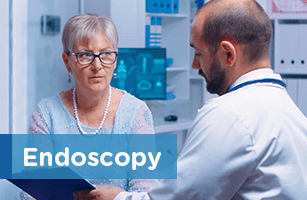The most reliable doctors in Mexico
Endoscopy information and locations in Mexico

With the use of an endoscopy, gastroenterologists can do minimally invasive procedures on the esophagus, stomach, intestines, bile duct, rectum, and anus to diagnose uncommon symptoms, confirm a diagnosis, and locate the source of the symptoms.
Endoscopies are performed by a gastroenterologist or general surgeon with a two year fellowship
in digestive endoscopy. During the procedure, the endoscopist passes through the mouth or rectum
a thin-flexible tube with a light and a camera attached that allows seeing images of the
digestive tract. If something is found, the specialist can take a biopsy or treat it at the same
time.
Contact any of the top specialists for endoscopic procedures in Mexico and save!
Most popular endoscopy procedures
Select the location to see prices and information about the clinic.
Colonoscopy
Average savings:
85.9%
Hospital stay: 2 hrs.
Cleared to fly 1 day
Hospital stay: 2 hrs.
Cleared to fly 1 day
View more
As an Amazon Associate, we earn from qualifying purchases.
Take a look at one of our medical tourism essentials for endoscopy.
Take a look at one of our medical tourism essentials for endoscopy.
Endoscopic additional procedures information
Gastritis
Gastritis, an irritation or inflammation of the stomach's lining, is typically caused by alcohol, stress, medications, infections, bile reflux, or Helicobacter pylori (bacteria). An upper endoscopy, in which the endoscopist (gastroenterologist) inserts the endoscope into the mouth to see the stomach lining, is used to detect gastritis.
Gastritis, an irritation or inflammation of the stomach's lining, is typically caused by alcohol, stress, medications, infections, bile reflux, or Helicobacter pylori (bacteria). An upper endoscopy, in which the endoscopist (gastroenterologist) inserts the endoscope into the mouth to see the stomach lining, is used to detect gastritis.
GERD
A gastroenterologist using endoscopy can diagnose gastrointestinal disorders. A number of examinations and procedures, such colonoscopies, upper endoscopies, CT scans, and X-rays, may be part of the screening process. GERD, IBS, celiac disease, Crohn's disease, and colorectal cancer are the most common disorders.
A gastroenterologist using endoscopy can diagnose gastrointestinal disorders. A number of examinations and procedures, such colonoscopies, upper endoscopies, CT scans, and X-rays, may be part of the screening process. GERD, IBS, celiac disease, Crohn's disease, and colorectal cancer are the most common disorders.
Gastrostomy tube – G-Tube
A gastrostomy tube or feeding tube involves introducing the endoscope through the mouth to see into the stomach, then, a small incision is made on the abdomen to introduce the tube. A G-tube is recommended for newborns with birth defects of the esophagus or for patients who can’t swallow or can’t take enough nutrients from food.
A gastrostomy tube or feeding tube involves introducing the endoscope through the mouth to see into the stomach, then, a small incision is made on the abdomen to introduce the tube. A G-tube is recommended for newborns with birth defects of the esophagus or for patients who can’t swallow or can’t take enough nutrients from food.

Best endoscopists in Mexico
We found the best specialists that meet our high-quality
standards. Select the city of your choice to see the
doctor’s profile and
prices.
Tijuana, B.C.
Dr. Marco Vargas
Mexicali, B.C.
Dr. Federico I. Hernandez
Puebla, Pue.
Dr. Erwin I. Marín
Benefits of an endoscopy
Can treat various problems
Endoscopies can help find the cause of heartburn, abdominal pain, and detect and treat ulcers, blockages, and abnormal growths.
Endoscopies can help find the cause of heartburn, abdominal pain, and detect and treat ulcers, blockages, and abnormal growths.
Minimal invasive
Endoscopic procedures are minimally invasive and do not require incisions. The endoscope is a safe and fast procedure that usually takes 20 to 30 minutes.
Endoscopic procedures are minimally invasive and do not require incisions. The endoscope is a safe and fast procedure that usually takes 20 to 30 minutes.
Outpatient
Most endoscopic procedures are performed as an outpatient and require 2 to 24 hours of hospital stay or until the sedation wears off.
Most endoscopic procedures are performed as an outpatient and require 2 to 24 hours of hospital stay or until the sedation wears off.
Select a procedure to see more information
Recent news
Article

Disclaimer: This information does not reflect the medical advice from our clinics. All cases are different and this treatment may not suit you. Always refer to a medical professional with the certification and experience. All of our physicians are fully qualified to perform these procedures. For more information and diagnosis contact one of our top specialized clinics.
In all medical procedures, there are chances of complications, the specialist will provide you detailed information about the risks of the procedure, talk to the specialist directly.
In all medical procedures, there are chances of complications, the specialist will provide you detailed information about the risks of the procedure, talk to the specialist directly.



